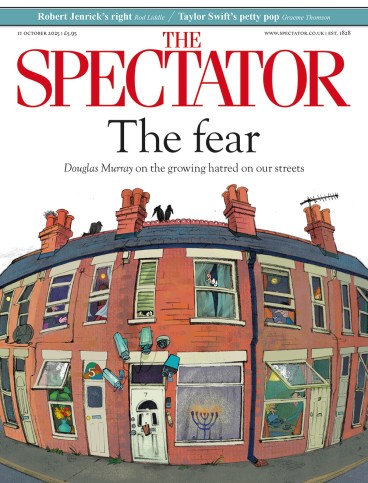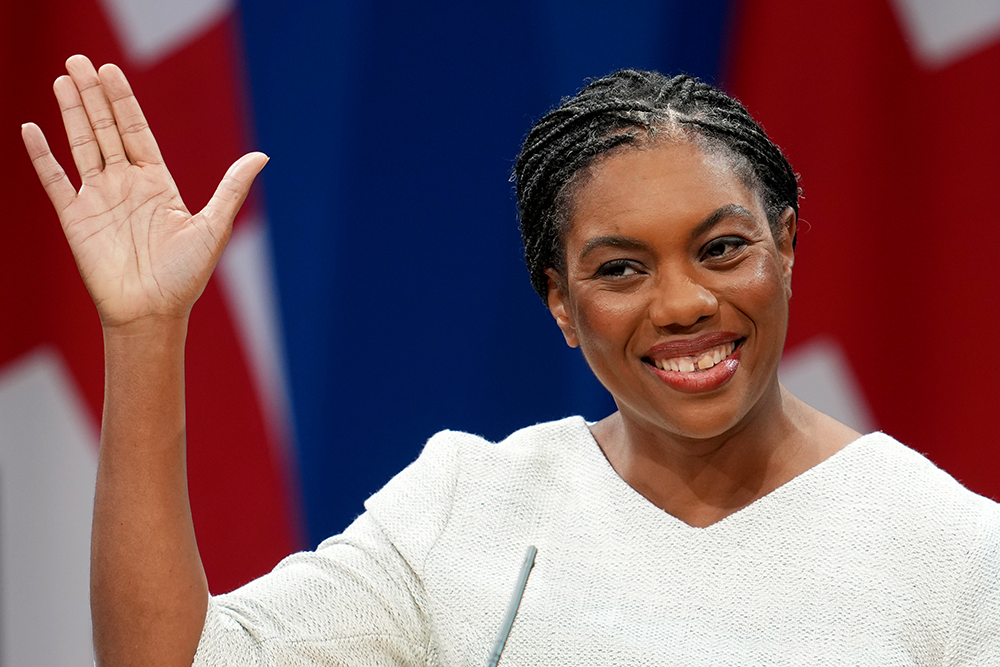
Tim Shipman has narrated this article for you to listen to.
British politics often resembles a golden-age murder mystery, with multiple parties sitting anxiously on the sofas/green benches waiting for the detective/electorate to crack the case. The Reform, Labour and Tory conferences provided a plethora of clues. But just as Sherlock Holmes solved ‘The Adventure of Silver Blaze’ by diving into the significance of the dog that didn’t bark, just as much can be learned from what didn’t happen over the past few weeks.
First, there was no serious leadership challenge from the pretenders in Labour or the Conservatives. Andy Burnham turned up in Liverpool with a knife between his teeth, only to discover he neither had a seat nor the 80 parliamentary supporters needed to challenge Keir Starmer. His antics were so counterproductive that, when the Tories descended on Manchester, Robert Jenrick kept his head down. In both cases this might be regicide merely deferred. When I interviewed Jenrick on Monday he said his favourite book was A Tale of Two Cities, which features a liberal use of the guillotine.
The most notable absence at Tory conference was people – both activists and corporate types who buy space in the commercial areas. Andrew Mitchell, the former international development minister, boasted he had bought his entire constituency delegation a round ‘because there are half as many of them as there were and I could actually get to the bar this year’.
One of the bar managers in the Midland, the conference hotel, noted dryly: ‘There are far fewer people but they are drinking more.’ Even the party’s enemies barely thought it worth protesting. Steve Bray, the anti-Brexit campaigner, was a no-show – as was the ‘Hang the Tories’ banner which usually adorns a railway bridge when the party is in the city.
Yet also absent was the expected misery. The party faithful wanted to see Kemi Badenoch get on the front foot. Arguably a year late announcing the Tories would leave the European Convention on Human Rights (ECHR), she made eye-catching economic pledges, taking a pinata stick to Labour and Reform’s magic money trees.
The announcement she would scrap stamp duty on main homes cut through in a way she hasn’t managed before. ‘It is a bad tax, it is an unconservative tax,’ Badenoch said. A senior aide added: ‘It’s a very big pro-growth measure.’ It will particularly please those in the Blue Wall who don’t get their kicks from migration control. Mel Stride, the shadow chancellor, had earlier outlined cuts worth £47 billion.
Also absent were any media gaffes, of which Badenoch had five at last year’s conference. Having, at last, acquired a message, the Tory leader stuck to it through numerous broadcast interviews, which upended Liz Truss in 2022. Badenoch emerged from an arduous media round on Tuesday to tell aides: ‘I really enjoyed that.’ A shadow cabinet minister noted: ‘She was hopeless to begin with but she’s got better.’
One bar manager noted: ‘There are far fewer people at this conference but they are drinking more’
Behind the scenes, many would like to see exemplary punishment for Truss, whose mini-Budget remains one of the Tories’ major millstones. Some want her expelled. ‘Voters would notice that,’ an MP said. A shadow minister had something even more exemplary in mind: ‘We should fire her out of a cannon into the middle of the Atlantic.’
Absent, too, were the predicted big defections to Reform. Nigel Farage’s team drip-fed the news that 20 Tory councillors were crossing the floor, but David Frost, who had been expected to jump ship last Sunday, and Suella Braverman remain Conservatives (for now). Mark Gallagher, the party donor who helped fund Badenoch’s leadership campaign, changed sides on Sunday. But Stride was cock-a-hoop when told the donor had given the Tories only £2,000 last year.
Andrew Griffith, the shadow business secretary, is spending much time ‘man marking’ senior business figures, holding dinners for those who have also been wooed by Richard Tice, Farage’s deputy, who is on a ‘steak and claret offensive’ in London’s Boisdale restaurant. So far they are watching Reform with interest but not yet committing their cash, and Tory fundraising is surprisingly buoyant.

Regardless, Reform can be happy that conference season was essentially dominated by them. Starmer’s speech in Liverpool was half an attempt to neutralise Farage’s appeal to the working classes and half an angry riposte to Reform. Badenoch’s ECHR announcement was also reactive.
But also missing was evidence Reform is yet ready to govern. Its Birmingham shindig was more rally than conference and big corporate sponsors were absent (with a few exceptions such as Heathrow). Farage made a cheerleading speech but didn’t attempt to show he is beginning to think about policy outside of his migration-crime sweet spot. There was barely any mention of schools or hospitals. In Kent, where the Reform-run council pledged to save millions, it now plans to increase council tax by 5 per cent.
If the Tories refused to die, there is little evidence they are ready to prosper either. A focus group of 2024 Tory voters conducted by JL Partners found a warm welcome for the ECHR plan but a general sentiment of ‘why should we trust the Tories on immigration?’ and confusion about Badenoch’s plan to scrap the Climate Change Act. All eight participants said they wanted Jenrick, not Badenoch to lead the party (and even picked Rishi Sunak, another absentee, over her).
Badenoch looks safe until May, when the Conservatives are expected to haemorrhage 1,000 councillors and most, if not all, of their seats in Scotland and Wales. Disgruntled Tory activists complain there is no support from Badenoch’s team. ‘No one at the centre seems to give a toss,’ said one Scottish candidate. When I asked Badenoch how often she had visited either country, she could not recall. Her fate hangs, MPs say, on whether she makes forward progress by May. ‘If we are consistently polling under 20 per cent I find it hard to see how she survives,’ said one shadow minister.
This is the Phony War stage of this parliament. Only at the Budget on 26 November will the scale of the national crisis and what the government plans to do about it be clear. In May we will discover who is really in pole position. Just as in 1940, things will get very much worse before they get better.









Comments